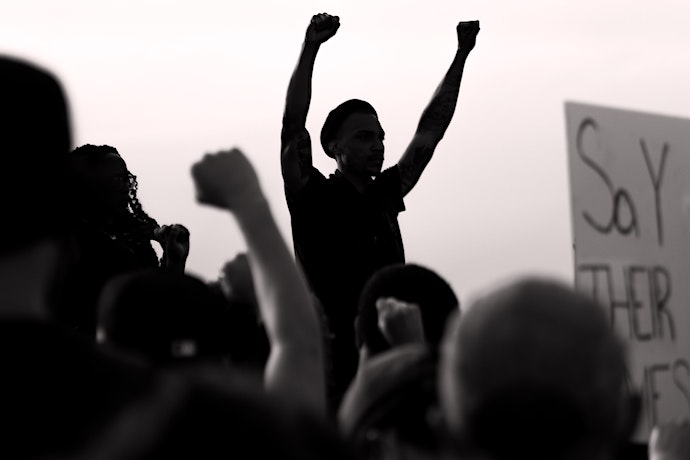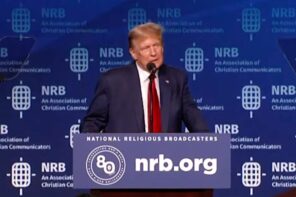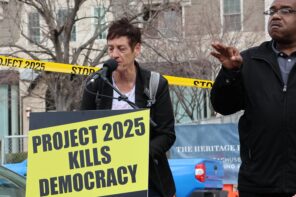As American society remains embroiled in an endless shouting match over cancel culture and canceling cancel culture, Columbia professor of linguistics and American Studies John McWhorter has entered the debate with his latest offering, Woke Racism: How A New Religion Has Betrayed Black America.* In this relatively slim volume, as the title makes quite clear, McWhorter takes aim at wokeness and its adjacent cancel culture to bemoan what he perceives as social justice activism run amok.
McWhorter is far from alone in his dismay at what seem to be the new rules of the road regarding public discourse. People all over the political spectrum have criticized the policing of speech and virtue-signaling. McWhorter will surely find a receptive audience as many find the confusing and sometimes contradictory rules for anti-racism (and other issues related to social justice) a dizzying array of dos and don’ts.
McWhorter takes a rather unconventional approach to anti-racism activism and discourse by treating it as a new religion he refers to as “Woke Racism.” As Vox’s “A History of Wokeness” documents, the concept of being “woke,” or more accurately “staying woke,” can be traced to the early 20th century as a constant reminder to African Americans to be aware of the current social and political climate.
As “stay woke” gave way to “being conscious” or “consciousness-raising” during the 1960s, the metaphor maintained its meaning as a directive that things aren’t always what they seem. Although “conscious” and later “woke” emerged as concepts within the Black community, McWhorter regards their acceptance by white allies as an ideological framework that’s reached the level of religious dogma, complete with prophets and sacrosanct beliefs.
For conservatives and right-wing activists, wokeness has become a convenient catch-all label for their ideological foes. Under the wokeness umbrella social conservatives can collectively smear critical race theory, gender identity theory, political secular humanism, socialism, and anything else deemed to be the boogeyman du jour.
It could be argued that wokeness has replaced political correctness—or “PC”—as the go-to idea to renounce in order to bolster one’s conservative bona fides. And the opponents of wokeness aren’t simply relegated to the right; there are those on the left who find the emphasis on identity politics and “corporate-sponsored wokism” to be little more than reactionary conservative politics dressed in liberal drag intended to shift the focus from current economic realities.
Throughout the book, McWhorter derisively refers to advocates of social justice as “The Elect” (borrowing the phrase from Joseph Bottum), claiming that this was a less pejorative alternative to “social justice warriors” or the “Woke mob.” But his “Elect” actually has more in common with the concept of “The Anointed” developed by Black conservative thinker Thomas Sowell, who decades earlier penned The Vision of the Anointed (and who more recently compared the widespread use of “systemic racism” to Nazi propaganda). Like McWhorter, Sowell viewed the post-1960s United States as a liberal social engineering experiment gone awry, with Black people paying the most exorbitant cost. Whether it’s Sowell’s “Anointed” or McWhorter’s “Elect,” the conclusion is the same: African Americans as a group are either unwitting or conscious dupes for liberal white social policy to their own detriment.
Borrowing from feminist chronology, McWhorter calls wokeness “third-wave antiracism,” with the abolitionist movement and Reconstruction comprising the first-wave of anti-racism and the civil rights movement signaling the second. For McWhorter, however, third-wave antiracism is a hollow sham that lacks the political objectives of earlier eras. This selective reading of African-American political agitation (cue ahistorical MLK reference) reveres the civil rights generation and locates the beginnings of the downfall of Black progress with the Black Power movement and its emphasis on the psychological effects of institutional racism as seen in the adoption of cultural nationalism.
Woke Racism falls in line with McWhorter’s previous works on racism and the state of Black America. His overarching thesis has remained the same for the past twenty years.
- Black people and their allies are too consumed with dismantling structural racism.
- Black people are largely held back not by structural racism but by cultural pathology (i.e., by their own inability to pull themselves up by their bootstraps).
- The goal of Black people should be the development of an individualist ethos that accepts the constraints of structural racism that can be overcome on a person-by-person basis through rededication to education, improved work ethic, and commitment to personal responsibility.
The minimizing of structural racism in favor of personal responsibility and cultural pathology is a favored talking point in Black conservative ideology and it’s one that has considerable traction within segments of the African-American community. However, the Black masses occupy a contradictory place in McWhorter’s mind throughout Woke Racism (as they do in all his books). Time after time, he asserts that rank-and-file Black people don’t think like the Elect, nor do they hold their rigid ideological positions. Rather they’re the victims of victimhood ideology being peddled by the Elect.
Left to their own devices, the masses of Black folks would have remained committed to the American individualist ethos and entered the land flowing with integrationist milk-and-honey were it not for those pesky Black Power demagogues of the 1960s with their dashikis, Afros, and Swahili names. Although McWhorter regards wokeness as a new religion, he often sounds like Moses condemning the children of Israel for worshipping the golden calf of Black Power.
In one breath, McWhorter hails the Black masses for not holding the same corrosive ideas as a Black leftist elite while assailing them for destructive cultural behaviors from which they must be saved, as his books describe in Losing the Race: Self-Sabotage in Black America and Winning the Race: Beyond the Crisis in Black America. Simply put, the Black masses and their folksy wisdom are a useful counter to the left-wing Black elite; until, that is, they’re needed as evidence of persistent cultural pathology. Keeping with the religious imagery that McWhorter directs at his opponents: he’s the voice crying in the wilderness for the good ol’ days of uplift ideology and respectability politics.
As questionable as McWhorter’s arguments against anti-racist thought are as an ideology, however, it’s his frame of analysis that I find more troubling. McWhorter deems wokeness to be a new religion. Had he simply declared wokeness a new ideology or simply stayed with his third-wave antiracism construct we could have simply debated the merits of his argument. Yet his declaration of wokeness as religion serves not as honest assessment of religious thinking in the form of social justice activism. Instead, religion is invoked as a ready-made punching bag for whenever he needs to reiterate the point that he finds the tenets of wokeness objectionable.
For scholars of religion this characterization of religion as an interpretative framework should be concerning. McWhorter spends little time explaining why religion rather than ideology is his preferred interpretative framework (and it clearly doesn’t take a religion scholar to point this out). He assumes that readers will share his perspective regarding the incompatibility of religious thinking and rational thinking. Throughout the book McWhorter’s use of religion only serves one purpose: it’s shorthand for backwards, closed-minded, illogical and irrational thinking. But it also betrays McWhorter’s own messiah complex in relation to Black people. To make this point, McWhorter invokes the well-worn trope of Jewish legalism when he states:
“The Elect are our Pharisees. In fostering antiracist ideas that actually harm black people, they are obsessed with the letter of the law rather than its spirit, and their prosecution of sinners contrasts with Jesus’s embrace of them.”
This rhetoric of Jewish legalism represents the danger and folly of McWhorter’s use of religion as an interpretive framework, as it so quickly slips into a good religion versus bad religion debate which necessitates us to ask, “Whose side is God(s) on?”
Rather than consider the meaning-making function of religion, which could be reasonably argued that wokeness does provide to its proponents, religion here is simply a useful rhetorical device devoid of serious contemplation. In a society in which the threats to social cohesion aren’t necessarily “stealing one’s neighbors ox” but rather reciprocating humanity regardless of one’s race, sexual orientation, or gender identity, thinking about how to deal with these new taboos may be a messy process that we don’t get right on the first attempt.
As stated from the outset, what we’ve come to regard as “wokeness,” whether it’s a new wave of anti-racist work or a complete departure from previous iterations isn’t beyond critique. But Woke Racism was not a critique (or investigation) for it already had a conclusion that was determined before the word “woke” entered the popular culture. This was a Black conservative jeremiad and McWhorter is its prophet of the day.
In 2008’s All About the Beat: Why Hip Hop Can’t Save Black America, McWhorter’s assault on hip-hop (his last proclaimed false messiah of Black people), he portrays any response to systemic racism that doesn’t conform to his version of Black conservatism as a continuation of Black people’s trek in the wilderness. Ironically, Woke Racism attests to McWhorter’s own religious thinking and messianic self-image in relation to the African-American community, best summarized by Mark 6:4, “A prophet is not without honor, but in his own country, and among his own kin, and in his own house.”
*Author’s Note: Since 2020, AP and other publishers—including RD—have capitalized Black when referring to the racial category. Throughout Woke Racism, McWhorter’s return to the use of the lower-case, black, is both linguistically petty and indicative of his disregard for anti-racist thought as psychologically insignificant.





